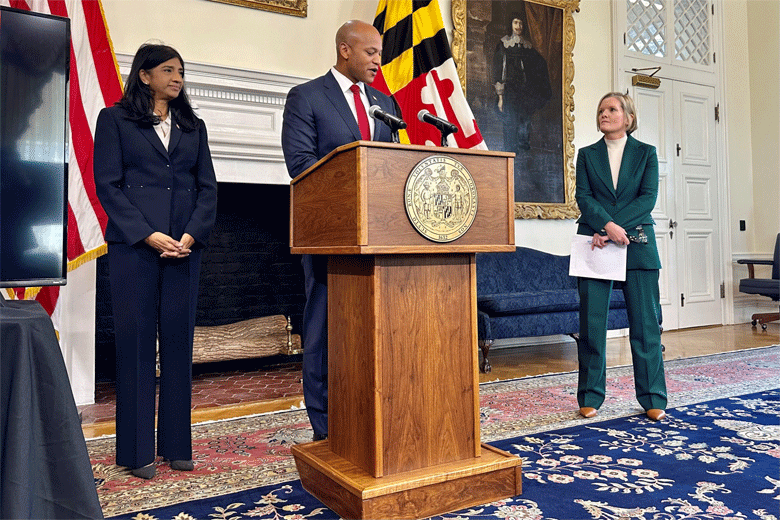This content was republished with permission from WTOP’s news partners at Maryland Matters. Sign up for Maryland Matters’ free email subscription today.
Gov. Wes Moore (D) said Monday that he will send a supplemental budget proposal to the General Assembly that would include nearly $35 million for salary increases for state employees and funding to replace the contractor at the Charlotte Hall Veterans Home.
Moore’s administration said the supplemental spending plan was necessary after the Board of Revenue Estimates projected a decrease in state revenues of nearly $478 million during the current and next fiscal year.
“Our supplemental budget adapts to new revenue projections while ensuring we invest in the priorities that matter most to Marylanders,” Moore said in a statement. “We’ve made it clear — our administration is here to make the lives of every Marylander better, and this budget plan meets that test in a responsible and strategic way.”

A draft of the proposal would shift state, federal and special funds around, ultimately adding about about $509 million in appropriations.
While a full copy of the budget proposal was not available from the Moore administration Monday, the bill is expected to be introduced Tuesday in the General Assembly.
The supplemental budget “meets the moment,” Moore’s office said, by focusing funding on rebuilding Maryland state government, and investing in public safety, anti-poverty programs, economic development and infrastructure.
The nearly $35 million for state employees would include additional negotiated salary increases for “a significant portion” of state executive branch employees, targeted to those who have had the lowest salary increases in recent years, an effort to improve employee retention, the administration said.
“Adding additional rungs to the pay scale along with winning a step increase for state workers with longevity is critical to retaining the seasoned staff who keep our state agencies going,” said Patrick Moran, president of AFSCME Maryland Council 3, the state’s largest employee union. “This step increase that honors those who have dedicated many years of their lives to serving Marylanders is a much-needed move in the right direction.”
The supplemental budget includes another $66 million “to tackle challenges across State agencies inherited from previous administrations,” Moore’s office said.
That includes nearly $12.7 million to provide for the procurement of a new contractor and associated costs at Charlotte Hall Veterans Home. Moore announced earlier this month that the state was canceling its contract with South Carolina-based HMR over concerns about abuse and neglect at the facility.
House Appropriations Chair Ben Barnes (D-Prince George’s and Anne Arundel) said the budget “reflects the Moore administration’s commitment to shoring up our agencies and state government after years of neglect.”
The supplemental budget was announced hours before the House of Delegates and Senate set teams of negotiators to iron out differences between the two budget proposals as passed by the chambers.
Moore’s plan incorporates many of the budget amendments under consideration in the General Assembly, state officials said.
“Today’s supplemental budget is reflective of the close collaboration between the Senate and the Moore Administration,” Senate President Bill Ferguson (D-Baltimore City) said in a statement. “The Senate is focused on finalizing a financially prudent budget that reflects investments in Maryland values over the next fiscal year. We balance the State’s immediate needs with savings for the future. I want to thank the Governor, Budget Secretary, and his staff for their commitment to a coordinated approach that supports all Marylanders.”
The Moore administration said other highlights of the supplemental budget will include $2.25 million for expanded free school meal programs, $1 million to help with burial costs for veterans’ spouses and dependents, $2 million for a women’s pre-release correctional facility, $25 million for the Rental Housing Works program, $2.5 million to support behavioral health expansions and $32 million in capital grants for 32 local nonprofit organizations.







